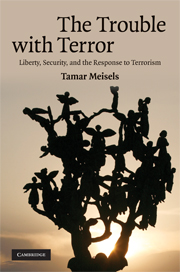Book contents
5 - Targeting terror
Published online by Cambridge University Press: 04 August 2010
Summary
The dramatic increase in Islamist terrorist activity throughout the world and in Arab terrorist activity in Israel throughout the last few years has placed the issue of combating terrorism at the forefront of moral philosophy (or should do). Curiously, as Western states wage “war on terror,” Israel finds itself increasingly under attack for its policy of assassinating terrorist leaders. It has been argued that Israel's “targeted killing” policy violates international standards of legitimate warfare. In the extreme, it has been claimed that this practice is on a moral par with the terrorist activity it purports to combat.
Indeed, targeted killing is most closely related to the practice of political assassination, with which it shares certain basic features. Certainly, it has more affinity with assassination, in name as well as deed, than with either conventional warfare or terrorist activity. This chapter deals exclusively with the targeted killing of terrorists rather than any other type of state-sanctioned assassination. Once again, terrorism is understood here, following Michael Walzer, as a particular form of political violence: the intentional random murder of defenseless non-combatants, many of whom are innocent even by the assailants' own standards (infants, children, the elderly and infirm, and foreign nationals), with the intent of spreading fear of mortal danger amidst a civilian population as a strategy designed to advance political ends. A brief comparison between political assassination and targeted killing suggests that the similarities and differences between them highlight the appropriate attitude towards anti-terrorist assassination policies.
Information
- Type
- Chapter
- Information
- The Trouble with TerrorLiberty, Security and the Response to Terrorism, pp. 129 - 164Publisher: Cambridge University PressPrint publication year: 2008
